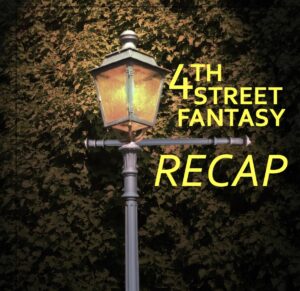Fourth Street Fantasy Convention has been one of my favorite cons—in both its incarnations—for years. Some years, I have a love/hate relationship with it, but I keep coming back. This year was no exception—I spent last weekend there, which is why you are getting a summary rather than a normal blog post. Its more of a reaction than a recap, though. There’s not enough space in a single blog post for a proper recap.
Unlike most SF conventions, Fourth Street doesn’t include a lot of the things you might expect. There hasn’t been a guest of honor in years. This year, there was no dealer’s room and no art show. There’s only one track of programming, and the programming is intentionally designed to spill over from the panelists to the audience. It’s more of a giant conversation than anything else.
And the thing about Fourth Street programming is that at least 90% of the time, panels that sound as if they are not going to interest me because of the topic as explained in the program notes end up being fascinating in the delivery. A big part of this is due to the care the programming department takes in choosing the panelists.
I had two favorites this year—first, “The Last Word,” which was a panel about writing death scenes, when killing off a character works and when it doesn’t, and a bit about what makes for a memorable, gut-wrenching death scene. I think the best piece of advice I got out of it was along the lines of “If the writer is trying to make the reader cry, it’s manipulation and often doesn’t work well. If the writer is trying to make the other characters in the book cry, it feels real and you usually get the reader to feel it as a bonus.”
The other one was, for me, this year’s sterling example of the panel that didn’t sound interesting but ended up fascinating. The title was “This Machine Kills You,” and it was billed as being about writing realistic military operations and institutions (that is my condensed version of the nearly 200 word panel description).
I don’t write military fiction. I don’t think I’ve written a battle (much less a war) since my first novel. I didn’t think I was going to get much out of it. But the panelists were a wide range of people who all had military experience, talking about how military organizations work and what makes portrayals of military organizations “realistic,” when the way people thought about military organization, who it was for, who ran it, and how it worked, (and the way people in military organizations think about themselves) are so very different if one is writing about Italian Renaissance mercenary companies vs. medieval peasant levies vs. the modern American type of military that is all over the movies and TV.
And not only was that panel fascinating, it left me with one of the best summaries of how talking about writing works that I have heard in a long time: “The truest thing you can say about any craft decision is ‘it depends’.”—Scott Lynch
Those two words (“It depends”) kept cropping up in panels all weekend, and it made me very happy. Because the tendency in panels at SF cons is often to provide authoritative information—this is how a thing works, this is what a thing does, this is how to do a thing. That works very well when you are talking about things like the speed of light or how a spectrometer works or the way a blacksmith makes horseshoes.
But the speed of light has a right answer; spectrometers all work basically the same way; making horseshoes requires the same set of steps, even if they are slightly different sizes depending on the horse. Writing decisions do not have that kind of uniformity. You can sometimes get the illusion of uniformity by talking in sweeping generalizations, but that isn’t very helpful when it comes down to writing whatever story you’re working on. The right decision for this book may not be the same as the one for that book, even if the stories seem very similar on the surface, and neither book’s right decision will work at all in this other book. And at Fourth Street, people don’t shy away from that.
Overall programming at Fourth Street tends to vary across a range. At one end, the panels have an overall flow or arc, even when the topics don’t seem to connect with each other. At the other, the panels feel random—still excellent individually, but as if somebody chose them by pulling topics out of a hat. This year felt somewhere in the middle for me. I did miss a couple of panels—one because of outside interruptions that delayed my departure for the convention, and one because I misread the schedule and was so overconfident that I didn’t bother to double check
Some of the feeling was probably also the result of outside events intruding. The convention hotel was about twenty minutes south of one of the political shootings that took place around 3 a.m. Saturday morning, and they didn’t catch the suspect until 11 p.m. Sunday. We weren’t in the lockdown area, but there was still a lot of shock and tension, especially among those of us who live here.
So that was my Fourth Street. We will return to regularly scheduled blog posts next week…




Leave a Reply